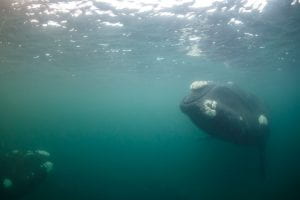Nearly 100 years after southern right whales were first protected from hunting, they face a new challenge: how to find food in a changing ocean.

Tohora – Eubalaena australis (Southern Right Whale) expedition at Port Ross in the subantarctic Auckland Islands, New Zealand.
Photograph Richard Robinson © 2020.
Rights managed image. No Reproduction without prior written permission.
I think of southern right whales as traditional kind of whales. They like to stick to the migratory patterns that their mums taught them; typically going to the same wintering ground to breed and the same summer feeding grounds to eat.
Kai is important to whales like southern rights: that summer feast provisions them and sustains their calf through the winter fast. And those calves are big – they are born at 4 or 5 m long and grow a metre a month. Clearly, having good kai means big mums who can support growing and healthy calves.
So when South African right whales started turning up on winter breeding grounds in the lowest numbers in decades, the first question was: where are they feeding? Is it changing? Can our traditional whales change as well?
Using microchemical markers called stable isotopes, we were able to look at where South African southern right whales were feeding over the past three decades. During the 1990s, the South African population was growing well the stable isotope data suggested they were feeding mainly on krill from South Georgia/Islas Georgias del Sur. In contrast, over the last 5 years, South African right whales have been having babies less often and the stable isotope data suggest that the whales are now feeding much further north, and are probably feeding on a range of krill and copepods.
On one hand this is good news; southern right whales can innovate and change their feeding traditions. The bad news is that this change hasn’t resulted in a benefit to the population – recovery has slowed. The optimist in me hopes that as the whales try new feeding strategies, they will discover new ones that provide more kai, leading to more babies and recovery. However, as the oceans continue to change, it could be a continual challenge to keep up with changing prey distribution.
Southern right whales are considered a sentinel for climate change by the International Whaling Commission – Southern Ocean Research Partnership. This is a group of scientists from around the world trying to understand how whales will fare in a changing ocean. Our work on South African southern right whales suggests that some are struggling to keep pace with climate change.
What does this mean for tohorā nō Aotearoa – New Zealand southern right whales?
Recent work by Otago University and others showed that tohorā are the fattest right whales in the world – suggesting they are getting plenty of kai. North Atlantic right whales, a Northern Hemisphere cousin to the southern species, are doing the worst. Although the North Atlantic right whales are also shifting their distribution, possibly also to find kai or avoid human activities, and this is leading them into trouble. About 1/8 North Atlantic right whales have died over the past couple of years, most due to ship strike and fishing gear entanglement, over the past couple of years. These skinny and scarred whales need a respite from human impacts to survive.
How are our whales doing so well but South African and North Atlantic right whales struggling? It is probably down to where and on what they are feeding – which we are still learning about.
Historically, tohorā were killed in summer and spring months east and north of New Zealand. However, satellite tracked whales from the Auckland Islands Maungahuka are actually migrating west – after 130 days of tracking, Wiremu/Bill the tohorā is west of Australia and still heading into the Indian Ocean.
Next year is the second and final field season for the tohorā project. We hope to tag more tohorā to bring the total to 20 tagged over 2 years. In addition, we are doing the same kind of stable isotope analysis as we did for the South African right whales – but using data from the 1990s, 2000s and 2020s. We hope to get a good picture of where tohorā are feeding, and how their feeding grounds and prey will change over time. By comparing the behaviour and recovery of different whale populations, we can start to understand what strategies will help them recovery from whaling in uncertain seas.
Find out more:
The paper, led by Gideon van den Berg who was co-supervised by Drs Els Vermeulen, Luciano Valenzuela and Emma Carroll, is out now in Global Change Biology.